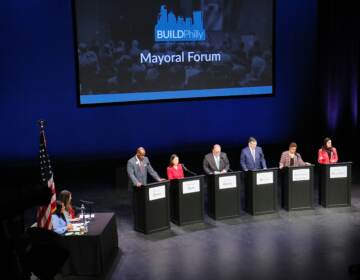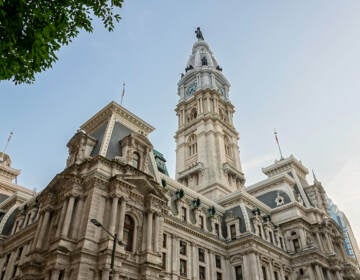Philly campaign contribution limits questioned
Mayoral candidate Alan Butkovitz questions city contribution limits, ethics chief responds.

Former city controller Alan Butkovitz announces he will run for mayor of Philadelphia. (Emma Lee/WHYY)
The Philadelphia mayor’s race is just a few months away, and one announced candidate says he’s frustrated with the city’s restrictions on political fundraising.
When former City Controller Alan Butkovitz announced plans to challenge Mayor Jim Kenney last week, he said the city’s campaign finance laws are a problem.
“What were supposed to be reforms in Philadelphia made it very difficult to raise the money to run for mayor dealing with the grassroots and Philadelphia business people,” Butkovitz said.
Asked if he would seek to abolish the city’s campaign contributions limits, Butkovitz hesitated.
“The question is, ‘can you put the genie back in the bottle now?’” Butkovitz said, “because what happened is as a result of that is [that] it’s all special interests and Super PAC’s [funding campaigns].”
Super PAC’s funded by local labor unions, wealthy school choice advocates, and billionaire liberal George Soros invested in independent expenditure efforts in the 2015 mayor’s race and the district attorney’s race last year.
Butkovitz said he believes contribution limits are a good idea, but he complained about the city’s 2005 pay-to-play law, which bars business owners from competing for city contracts if they exceed prescribed contribution limits.
City Ethics Board Executive Director Shane Creamer declined to respond directly to Butkovitz but said in an interview he thinks the rules are achieving their intended purpose.
“You don’t have potential city vendors giving six-figure contributions to city candidates who then get lucrative contracts from the city,” Creamer said.
Creamer acknowledged that U.S Supreme Court decisions permit big donors to influence city elections through Super PACs, but he noted that Philadelphia has placed greater restrictions on their activities than federal regulators and required more frequent and detailed disclosure of their operations.
Creamer said candidates for all municipal offices should know there are strict limits for campaign contributions and regular reporting requirements, and that his staff offers training to help them follow the rules.
“We want to make sure everybody understands what the rules are, where the boundaries are,” Creamer said, “but if they cross those boundaries there are going to be consequences in Philadelphia.”
The Ethics Board has four candidate training sessions scheduled between Nov. 27th and Dec. 20th. Details are on its website.
WHYY is your source for fact-based, in-depth journalism and information. As a nonprofit organization, we rely on financial support from readers like you. Please give today.





